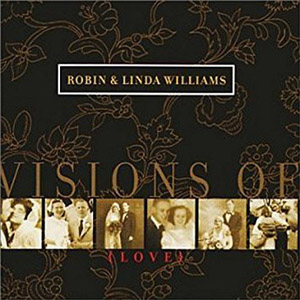(This review was written by Judith Gennett for a prior incarnation of GMR.)
 Visions Of Love is, by my count, the sixteenth album by American music harmonists Robin and Linda Williams. It is produced by Garrison Keillor and, unlike most of their other releases, it contains no originals but rather covers of old songs they’ve “known for a while.” The songs are indeed about “love,” but not always the “romance” we think of.
Visions Of Love is, by my count, the sixteenth album by American music harmonists Robin and Linda Williams. It is produced by Garrison Keillor and, unlike most of their other releases, it contains no originals but rather covers of old songs they’ve “known for a while.” The songs are indeed about “love,” but not always the “romance” we think of.
Linda, who like me is from Alabama, met Robin, who is from North Carolina, in 1971. A couple years later they drove their VW Beetle up to Minneapolis and in 1975 released an LP called Robin and Linda Williams. They also started singing on The Prairie Home Companion, which is where I must have first heard them when I lived up in Duluth. I pulled out my old 80s LPs for comparison, lingering on “Don‚t Let Me Come Home A Stranger.” Is anything really different on this album? The old mellow bluegrassy harmonies are still there, but Linda’s vibrato is not. The energy level is not so high, things are not quite as crisp; I remember thinking that on their 1998 originals release Devil Of A Dream. But really, not much has happened and that is just fine.
Visions commences with Linda and “I’ll Twine Mid the Ringlets,” better known from the Carter Family and Joan Baez as “Wildwood Flower,” but with lyrics from a few sources. The words are so pretty: “He taught me to love him and called me his flower That blossomed for him all the brighter each hour But I awoke from my dreaming my idol was clay My visions of love have all faded away….”
This mountain song is among the nicest on the album. This bouquet gives way to: “The bottle’s almost empty/the clock just now struck ten/Darling I had to call you/to our favorite place again… There’s nothing cold as ashes after the fire is gone…”
Here is a classic Conway Twitty/Loretta Lynn duet with plenty of whine and tasteful honky-tonk piano. Then Visions move on to a gentle “You’re Running Wild,” a Louvin Brothers cover featuring Linda with Robin on harmony, and then Robin’s bluesy wail on Hank Williams’ “Ramblin’ Man.” There are thirteen songs here and thirteen classics in various rootsy styles, mediated by an all-acoustic accompaniment and the lightness of the harmonies. Included are country, traditional, blues, hymns, “Keep the Home Fires Burning,” and Bruce Springsteen, but all within a certain range of American music. A track I really like for the lyrics is by Merle Haggard, called “Hungry Eyes.” “Mama never had the luxuries she needed, but it wasn’t because my daddy didn’t try.” Linda sings this in a contemporary style to guitar accompaniment. Another fine track, actually a tour de force, is a wail of a traditional Appalachian song from Roscoe Holcomb, “Wandering Boy”. It is sung in lonesome, stark duet and harmony with backing fiddle by Peter Ostroushko.
The supporting instrumentals are skillful but give way to the singers. Linda and Robin play guitar, which is often heard, and a few other instruments. Richard Dworsky both stands out and blends in on piano on some of the less “folky” tracks, and Peter Ostroushko, also a PHC veteran, plays mandolin as well as fiddle. The tracks have enough diversity to keep the album moving but enough similarity to keep it together, although the styles move around enough to potentially irritate a few listeners who might not like, for instance, vintage country music or “piano-bench favorites.”
(Sugar Hill, 2002)
